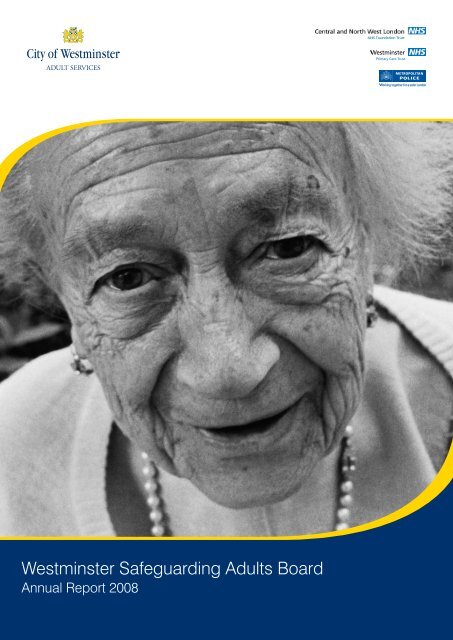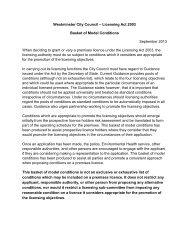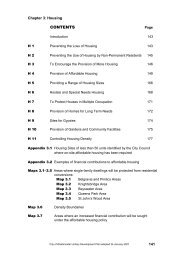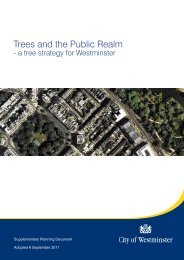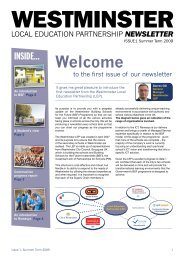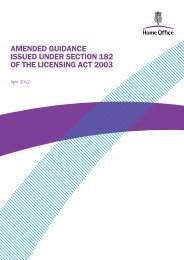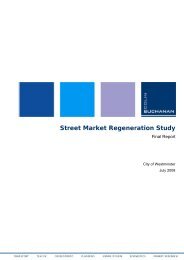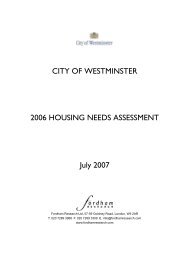Westminster Safeguarding Adults Board - Westminster City Council
Westminster Safeguarding Adults Board - Westminster City Council
Westminster Safeguarding Adults Board - Westminster City Council
Create successful ePaper yourself
Turn your PDF publications into a flip-book with our unique Google optimized e-Paper software.
<strong>Westminster</strong> <strong>Safeguarding</strong> <strong>Adults</strong> <strong>Board</strong><br />
Annual Report 2008
<strong>Westminster</strong> <strong>City</strong> <strong>Council</strong> › <strong>Safeguarding</strong> <strong>Adults</strong> <strong>Board</strong> Annual Report 2008 <strong>Westminster</strong> <strong>City</strong> <strong>Council</strong> › <strong>Safeguarding</strong> <strong>Adults</strong> <strong>Board</strong> Annual Report 2008 <br />
Contents<br />
National context: No secrets 2<br />
Beyond no secrets 3<br />
Letter from the Chair of the <strong>Board</strong> 4<br />
This year’s achievements 5<br />
<strong>Westminster</strong> <strong>Safeguarding</strong> <strong>Adults</strong> board<br />
<strong>Board</strong> sub group: Mental Capacity Act Local Implementation Group<br />
<strong>Board</strong> sub group: <strong>Safeguarding</strong> <strong>Adults</strong> Policy and Procedures<br />
Review group<br />
Consistent application of the multi-agency policy<br />
Training and development<br />
Working with partner agencies<br />
Metropolitan Police<br />
Central and North West London Foundation Trust<br />
<strong>Westminster</strong> Primary Care Trust<br />
Imperial College Healthcare NHS Trust<br />
Supported Housing, the Voluntary and Independent Sector<br />
Abuse prevention<br />
Links to strategic partnerships: Crime and disorder<br />
Service users as key partners<br />
Reporting and monitoring activity<br />
Lessons learned: Assuring quality<br />
<strong>Safeguarding</strong> developments<br />
Last word<br />
Appendices<br />
1. Organisations attending training courses<br />
2. <strong>Westminster</strong> <strong>Safeguarding</strong> <strong>Adults</strong> action plan 2008/09<br />
3. <strong>Safeguarding</strong> vulnerable adults in <strong>Westminster</strong><br />
End-of-year Monitoring Report 2007-08<br />
n<br />
n<br />
n<br />
n<br />
n<br />
n<br />
n<br />
n<br />
n<br />
n<br />
n<br />
Glossary<br />
n
<strong>Westminster</strong> <strong>City</strong> <strong>Council</strong> › <strong>Safeguarding</strong> <strong>Adults</strong> <strong>Board</strong> Annual Report 2008 <strong>Westminster</strong> <strong>City</strong> <strong>Council</strong> › <strong>Safeguarding</strong> <strong>Adults</strong> <strong>Board</strong> Annual Report 2008 <br />
National Context: No Secrets<br />
‘No Secrets: Guidance on developing and implementing multi-agency policies and<br />
procedures to protect vulnerable adults from abuse’ was published in 2000 by the Department<br />
of Health. It responded to the findings of an investigation into systematic sexual, physical, and<br />
emotional abuse, and neglect of people with learning disabilities, over a period of ten years, at<br />
Longcare in Buckinghamshire.<br />
No Secrets was the first coherent national policy statement to establish a single system, with<br />
clear lines of responsibility and accountability, to tackle the abuse of people made vulnerable<br />
by age, disability or poor physical or mental health. It is rooted in the Human Rights Act 1998<br />
and upholds the right of all individuals, regardless of their circumstances, to live their lives free<br />
from violence and abuse.<br />
No Secrets is based on the premise that some groups of adults experience a higher<br />
prevalence of abuse and neglect than the general population, and that they are also not easily<br />
able to access services to enable them to live safer lives.<br />
No Secrets identifies five types of abuse. They are physical, sexual, emotional or<br />
psychological, financial and neglect. Institutional and discriminatory abuse have since been<br />
identified as additional types of abuse.<br />
No Secrets identifies adult social services departments as the lead agencies in the<br />
investigation of abuse. It also places responsibility on all agencies working with adults<br />
who may be deemed to be vulnerable to have clear policies, procedures and systems for<br />
responding to allegations of abuse.<br />
It places an obligation and responsibility on all health and social care agencies, and the<br />
police, to co-operate with and participate in joint systems, including multi-agency forums, to<br />
protect vulnerable adults from abuse.<br />
In <strong>Westminster</strong>, these responsibilities are taken very seriously and the work required to<br />
prevent and protect or safeguard vulnerable adults from abuse is led by the multi-agency<br />
<strong>Safeguarding</strong> <strong>Adults</strong> <strong>Board</strong>. This report outlines what the <strong>Board</strong> has achieved during the past<br />
year and its plans for the year ahead.<br />
Beyond No Secrets<br />
Since the publication of No Secrets, which is currently under review, there have been a number<br />
of national developments which have significance for safeguarding adults work in <strong>Westminster</strong>.<br />
In 2005, the Association of Directors of Social Services introduced a safeguarding adults<br />
best practice guide. The guide contains standards for the systems designed to protect adults<br />
made vulnerable by age, illness, disability or circumstances. It shifts the notion of vulnerability<br />
from the person themselves to the circumstances they find themselves in: “The concept of a<br />
vulnerable adult is replaced with an assessment of the risk posed by the abuse and neglect, to<br />
the quality of life of the individual adult concerned”. The <strong>Board</strong> has adopted the terminology of<br />
‘safeguarding adults’ to replace ‘adult protection’ as this embraces a more robust approach to<br />
preventing as well as responding to abuse. It also uses the framework to guide and inform its<br />
key objectives and annual work plan.<br />
Last year, a national survey was conducted by Action on Elder Abuse and funded by Comic<br />
Relief into the prevalence of abuse and neglect of older people. The report, published in June<br />
2007, confirmed that one in 40 older people are experiencing mistreatment that occurred<br />
within a relationship of trust; family members, close friends and care workers. This statistic<br />
suggests that over 300 older people aged 65 to 74 experience abuse in <strong>Westminster</strong>. At<br />
present, less than a third of these people are coming forward to seek help so raising public<br />
awareness of safeguarding adults is a key priority for the coming year.<br />
Staff in all agencies have been trained to work within the requirements of the Mental Capacity<br />
Act 2005, which came into force from April 2007. The Act enshrines five principles for decisionmaking,<br />
sets up independent mental capacity advocates, and strengthens the protection<br />
offered by the courts to people whose ability to make key decisions that impact on their wellbeing<br />
is impaired. In the year ahead, work will be carried out to assess the needs of people<br />
who may be deprived of liberty under the Act.<br />
The <strong>Safeguarding</strong> Vulnerable Groups Act 2006, which will be enacted next year, introduces a<br />
vetting and barring scheme which will screen all staff working in health and social care, in the<br />
statutory and voluntary sector, for their suitability to work with children and vulnerable adults. It<br />
replaces the Protection of Vulnerable <strong>Adults</strong> (POVA) list.<br />
The Domestic Violence Crime and Victims Act 2004 increased the protection, support and<br />
rights of victims and witnesses of domestic violence, including vulnerable adults who may be<br />
being abused by a family member. In <strong>Westminster</strong>, this work will be co-ordinated by the Multiagency<br />
Risk Assessment Conference operational from September 2008.
<strong>Westminster</strong> <strong>City</strong> <strong>Council</strong> › <strong>Safeguarding</strong> <strong>Adults</strong> <strong>Board</strong> Annual Report 2008 <strong>Westminster</strong> <strong>City</strong> <strong>Council</strong> › <strong>Safeguarding</strong> <strong>Adults</strong> <strong>Board</strong> Annual Report 2008 <br />
Letter from the Chair of the <strong>Board</strong><br />
The <strong>Westminster</strong> <strong>Safeguarding</strong> <strong>Adults</strong> <strong>Board</strong> is a multi-agency partnership responsible for<br />
leading and overseeing all strategic and operational inter-agency safeguarding adults work in<br />
<strong>Westminster</strong>, as required by No Secrets.<br />
The <strong>Board</strong> is made up of representatives from all key statutory agencies, and from the<br />
independent and voluntary sector. Members of the <strong>Safeguarding</strong> <strong>Adults</strong> <strong>Board</strong> are sufficiently<br />
senior to represent their organisation and to make multi-agency agreements on behalf of their<br />
organisation.<br />
This year, facing the challenge of delivering independence, well-being and choice, the <strong>Board</strong><br />
has been determined to work together to strengthen the safeguarding adults systems within<br />
the <strong>City</strong>. We have been developing a network of safeguarding “champions” in all the statutory<br />
agencies and our third sector partner organisations. We are working with service users and<br />
carers as experts and care partners to raise awareness of abuse and promote dignity and<br />
respect in local services.<br />
In general, <strong>Westminster</strong> residents are well served and protected from abuse and harm by the<br />
responsiveness and diligence of front-line staff and managers in all services. But we are not<br />
complacent and are committed to continuously improving our performance in this key area,<br />
and in raising public awareness of adult abuse to the same level of that of protecting children.<br />
To this end, the <strong>Board</strong> commissioned an evaluation in year of its <strong>Safeguarding</strong> activity, using<br />
case samples and interviews with key stakeholders. This has given us a position statement<br />
with regard to the effectiveness of its current systems and recommendations for improvement.<br />
A key recommendation has already been met. <strong>Westminster</strong> <strong>City</strong> <strong>Council</strong> and Primary Care<br />
Trust have jointly funded a full-time safeguarding adults lead post. The post-holder is working<br />
with frontline staff in all agencies to develop their practice in the context of transformation of<br />
Adult Social Care, helping staff to meet the challenge of balancing risk and safeguarding with<br />
increased user choice, independence and self-directed care.<br />
The safeguarding adults lead is developing an audit tool to help track cases more<br />
systematically. This will capture outcomes for service users and any learning from practice,<br />
and inform the workforce development strategy and fine-tune <strong>Safeguarding</strong> procedures.<br />
By this time next year, we anticipate being able to strongly evidence the improvements we<br />
have made to the safety and well-being of <strong>Westminster</strong>’s most vulnerable residents, hopefully<br />
using their own testimony, as expert partners in safeguarding adults.<br />
Zena Deayton<br />
Assistant Director<br />
Social Care Services<br />
This year’s achievements<br />
<strong>Westminster</strong> <strong>Safeguarding</strong> <strong>Adults</strong> <strong>Board</strong><br />
The <strong>Safeguarding</strong> <strong>Adults</strong> <strong>Board</strong> has worked hard this year to strengthen its membership<br />
so that all key partner agencies are properly represented and that each member is able to<br />
champion safeguarding effectively within their organisation. Members have been working to<br />
ensure that their work on the <strong>Board</strong> is directly linked to the governance arrangements of their<br />
organisation. This is in line with standards 1 and 2 of the Association of Directors of Adult<br />
Social Services (ADASS) National Framework of Standards for best practice in safeguarding<br />
adults. <strong>Board</strong> members attended an away-day in April 2008, which provided the opportunity to<br />
reflect on their responsibilities and track the progress of key priorities.<br />
The safeguarding adults work plan has been linked to the ADASS National Framework of<br />
Standards for the past two years. The 2007/08 plan was ambitious. Most of the tasks have<br />
been completed and it has served to demonstrate the need for more designated staff time to<br />
ensure all aspects of work are robust and safe.<br />
<strong>Board</strong> sub-group: Mental Capacity Act 2005 Local Implementation Group<br />
The <strong>Westminster</strong> Local Implementation Group with representatives from key health, social<br />
care and voluntary organisations was set up in November 2006 as a sub-group of the<br />
<strong>Safeguarding</strong> <strong>Adults</strong> <strong>Board</strong>. The work of this group has ensured that the Mental Capacity Act<br />
has been publicised as widely as possible throughout the <strong>City</strong>, using websites and printed<br />
material. The training programme has been very successful in developing staff confidence<br />
and competence in all partner agencies to support decision-making and undertake mental<br />
capacity assessments.<br />
The effectiveness of the training strategy is reflected in the number of appropriate referrals that<br />
have been made by <strong>Westminster</strong> to the Independent Mental Capacity Advocate service.<br />
<strong>Westminster</strong> led the tendering and contract let process for the Independent Mental Capacity<br />
Advocate service across seven London boroughs to ensure that a specialised service could<br />
be provided for a range of client needs. The contractor providing the Independent Mental<br />
Capacity Advocate service is performing well across all seven boroughs.<br />
Ongoing staff advice and guidance on specific cases continues to be provided by a Mental<br />
Capacity Act champions group, made up of staff representatives from adult social and health<br />
care teams.<br />
The Local Implementation Group refreshed its terms of reference in March 2008. It will coordinate<br />
<strong>Westminster</strong>’s multi-agency response to the introduction of Deprivation of Liberty,<br />
building on the networks and strategies that have been so effective with the implementation of<br />
the Mental Capacity Act. A time-limited senior level post will be created to develop the systems<br />
required to support staff in all agencies to respond consistently, effectively and within the law.
<strong>Westminster</strong> <strong>City</strong> <strong>Council</strong> › <strong>Safeguarding</strong> <strong>Adults</strong> <strong>Board</strong> Annual Report 2008 <strong>Westminster</strong> <strong>City</strong> <strong>Council</strong> › <strong>Safeguarding</strong> <strong>Adults</strong> <strong>Board</strong> Annual Report 2008 <br />
<strong>Board</strong> Sub-Group: <strong>Safeguarding</strong> <strong>Adults</strong> Policy and Procedures Review Network<br />
The refreshed <strong>Westminster</strong> <strong>City</strong> <strong>Council</strong> and Royal Borough of Kensington and Chelsea’s<br />
multi-agency policy and procedures, first published in 2002, will be re-launched at a<br />
safeguarding adults conference in October 2008. The task has been more substantial than<br />
envisaged because of national developments in safeguarding adults.<br />
<strong>Westminster</strong> is a member of the London Adult Protection Network, which is currently working<br />
with the Social Care Institute of Excellence and Care Services Improvement Partnership to<br />
develop a pan-London <strong>Safeguarding</strong> <strong>Adults</strong> Strategy. The strategy will be published in 2010.<br />
As with the London <strong>Safeguarding</strong> Children’s Strategy, it will remove the need for borough<br />
specific policy and procedures and facilitate inter-authority working. It will also simplify referral<br />
and response arrangements for provider agencies and Trusts including the police and the<br />
London Ambulance Service, who work across boroughs.<br />
Consistent application of the <strong>Safeguarding</strong> <strong>Adults</strong> policy and procedure<br />
The <strong>Safeguarding</strong> <strong>Board</strong> commissioned an evaluation to find out how well <strong>Westminster</strong><br />
residents are protected from abuse by safeguarding adults systems. This report has provided<br />
qualitative data to supplement the prevalence data that is collected each year and reported to<br />
the <strong>Board</strong> at its quarterly meetings.<br />
The evaluation adopted a whole system approach, using a representative sample of case<br />
studies, interviews and meetings with key stakeholders including staff, service users, carers<br />
and partner agencies.<br />
The findings and recommendations of the report are listed below:<br />
1. There is commitment and willingness among practitioners and managers to undertake<br />
safeguarding adults work.<br />
2. Great importance is attached to the early alerting stage of the process and clarity of<br />
responsibility on the part of <strong>Safeguarding</strong> Managers.<br />
3. <strong>Safeguarding</strong> managers and practitioners are open, willing and keen to improve and evolve<br />
their own practice and to see procedures updated and made clearer and more accessible.<br />
4. There are examples of outstanding practice and tenaciousness which has resulted in<br />
positive outcomes for clients who have been protected from harm.<br />
5. There are also examples of excellent practice in relation to vulnerable adults who make<br />
unwise decisions and choices. Practitioners are not complacent about these situations,<br />
nor complicit in service users coming to harm, but they are able to investigate, analyse<br />
and support service users’ wishes and rights to self determination in an exemplary way.<br />
6. Multi-agency strategic ownership and oversight of safeguarding needs strengthening and<br />
the chair and members of the <strong>Board</strong> are working towards achieving this.<br />
7. The lack of dedicated operational level resources to support safeguarding work<br />
(systematic case tracking; monitoring of practice and practice activity data; support<br />
for strategy and case conferencing activity) is felt by all. The appointment of a full-time<br />
safeguarding adults lead will help to overcome this.<br />
8. There is a need to revisit and refresh thresholds, key definitions and procedures across<br />
the board to reflect recent shifts and to communicate key messages about expectations<br />
across the system. The policy review and training programme is well placed to deliver this.<br />
9. The consistency of case recording needs to be improved across and within teams.<br />
10. There appears to be a concentration of activity and effort at the initial stages and at points<br />
of referral with a tendency for activity, including review activity to ‘tail off’ or be overlooked<br />
in recording.<br />
11. Risk assessment and risk recording beyond alert and strategy decision stages need to<br />
be strengthened.<br />
12. There are complex issues in relation to care providers, which encompass questions<br />
about thresholds and definitions, such as where does concern about good care end and<br />
concern about abusive or negligent care begin<br />
13. There is a lack of clarity about how safeguarding and staff disciplinary procedures<br />
separate and interact, particularly in provider settings.<br />
The response of the board to the Evaluation has been to take the following actions:<br />
› appoint a full-time safeguarding adults lead<br />
› appoint a full-time Deprivation of Liberty project work<br />
› seek joint funding for a <strong>Safeguarding</strong> <strong>Adults</strong> Quality Assurance Officer to assist with case<br />
tracking and audit, and administering meetings and minute-taking<br />
› review the training and development programme and work with providers to identify the<br />
learning needs in relation to safeguarding adults and Dignity in Care<br />
› complete and publish refreshed policy and procedures in October 2008<br />
› design a publicity campaign to raise public awareness of safeguarding adults<br />
› develop a case tracking and care audit process<br />
› organise a safeguarding adults conference to demonstrate the commitment of key partners<br />
to safeguarding adults work at both strategic and operational levels of their agency<br />
› introduce standard forms to record key decisions including assessment of risk or<br />
seriousness; referral forms; minutes of strategy meetings or discussions and case<br />
conferences and safeguarding plans.
<strong>Westminster</strong> <strong>City</strong> <strong>Council</strong> › <strong>Safeguarding</strong> <strong>Adults</strong> <strong>Board</strong> Annual Report 2008 <strong>Westminster</strong> <strong>City</strong> <strong>Council</strong> › <strong>Safeguarding</strong> <strong>Adults</strong> <strong>Board</strong> Annual Report 2008 <br />
›<br />
›<br />
›<br />
›<br />
Reintroduce practice forums for practitioners and <strong>Safeguarding</strong> <strong>Adults</strong> Managers<br />
Develop sub-groups of the board to progress the key work streams such as case review,<br />
training and communications<br />
Build <strong>Safeguarding</strong> into all aspects of Transformation of Social Care work<br />
Set up and publicise a designated safeguarding adults line and safe-haven fax to receive<br />
referrals from the public, the police, London Ambulance Service and the Commission for<br />
Social care inspection. This is being widely publicised<br />
<strong>Safeguarding</strong> adults staff training and development<br />
<strong>Safeguarding</strong> adults work is complex and can only be done well by skilled and resourceful<br />
people. We are fortunate in <strong>Westminster</strong> to be able to attract and retain high calibre staff and<br />
are committed to supporting and developing them to do this challenging work.<br />
This year, we have taken the opportunity to refresh the content of our development and training<br />
activities and our pool of trainers using an evidence-based assessment of training needs.<br />
New courses included Investigating Suspicions of Abuse and Financial and Material Abuse.<br />
Furthermore, the Service Manager has delivered a series of briefings to a variety of organisations.<br />
We have made sure that safeguarding policy and procedures underpin all of the training<br />
relating to vulnerable adults eg Mental Capacity Act, HIV Awareness and Challenges to Mental<br />
Health in Later Life.<br />
All <strong>Westminster</strong> social care providers were sent a questionnaire in May 2007, asking them to<br />
detail the percentage of staff that have received safeguarding training, by team, during the<br />
previous year. There was a 100% return rate and the questionnaire has been sent out again to<br />
gather data for 2007/08. The information is being used to analyse the providers’ training needs,<br />
to inform the commissioning priorities and plan with providers how best to address the gaps.<br />
The safeguarding adults development and training programme is available to council staff and<br />
partner agencies in health, housing, MPS and the voluntary sector. Some training is provided<br />
by a reciprocal arrangement with Royal Borough of Kensington and Chelsea. <strong>Westminster</strong><br />
<strong>City</strong> <strong>Council</strong> currently funds the programme, with contributions from the Royal Borough of<br />
Kensington and Chelsea and <strong>Westminster</strong> Primary Care Trust.<br />
The core <strong>Safeguarding</strong> Adult modules are:<br />
› protection of vulnerable adults - stage 1<br />
› identifying and investigating financial and material abuse <br />
› legal aspects of safeguarding adults, adult protection and risk<br />
› developing effective investigation skills<br />
› adult protection enquiry co-ordinator training – co-ordinating multi-agency responses to<br />
allegations of abuse<br />
In addition to the modules outlined above, the inter-agency programme offers a wide range<br />
of courses such as Mental Capacity Act, Living with Dementia, Capacity and Consent and<br />
Valuing Diversity. All of this training is underpinned by reference to safeguarding adults multiagency<br />
policy and procedures.<br />
We will be updating our workforce plan and workforce development strategy, beginning<br />
with an away day for the <strong>Safeguarding</strong> <strong>Adults</strong> <strong>Board</strong> in April. The strategy will respond to<br />
the recommendations of the evaluation report and will be circulated to all key agencies for<br />
contributions and comments.<br />
The number of people who attended training as part of the safeguarding adults programme<br />
2007 – 2008 is outlined in the table below:<br />
Training course<br />
Protection of Vulnerable <strong>Adults</strong> (stage 1) 144<br />
Investigating Suspicions of Abuse 26<br />
Financial and Material Abuse 10<br />
Legal Aspects of <strong>Safeguarding</strong> 13<br />
Community Care Legislation 16<br />
Risk Assessment (Legal Aspects) 10<br />
Adult Protection Enquiry Co-ordinators (run jointly with<br />
Royal Borough of Kensington and Chelsea)<br />
Supported attendance at external conferences 2<br />
Total 234<br />
Complementary Development & Training<br />
Capacity and consent 60<br />
Mental Capacity Act briefings 707<br />
Mental Capacity Act assessments 175<br />
Total 942<br />
Team briefings and contributions to training<br />
<strong>Westminster</strong><br />
Primary Care Trust<br />
(WPCT)<br />
<strong>Westminster</strong> <strong>City</strong><br />
<strong>Council</strong> (WCC)<br />
Central North West<br />
London Foundation<br />
Trust (CNWL)<br />
Six teams and sessions in induction, refresher and<br />
domestic violence<br />
Six teams, three practice forums, providers conference,<br />
LDQ<br />
Three teams 47<br />
St Mary’s Three teams 35<br />
Independent Princess Grace Hospital Managers 8<br />
Total 321<br />
Attendees<br />
3<br />
129<br />
102<br />
<br />
This is a new course. The course was designed and delivered by two <strong>Adults</strong> Services Team Managers with presentations<br />
from the Metropolitan Police, Service, the Public Guardian’s Office and the Department for Work and Pensions.<br />
For a list of organisations who attended the courses, please see Appendix 1
10 <strong>Westminster</strong> <strong>City</strong> <strong>Council</strong> › <strong>Safeguarding</strong> <strong>Adults</strong> <strong>Board</strong> Annual Report 2008 <strong>Westminster</strong> <strong>City</strong> <strong>Council</strong> › <strong>Safeguarding</strong> <strong>Adults</strong> <strong>Board</strong> Annual Report 2008 11<br />
Working with partner agencies<br />
Metropolitan Police<br />
Successful joint working with the police at an operational level, has resulted in a key case<br />
being taken to court. Representation on the <strong>Safeguarding</strong> <strong>Adults</strong> <strong>Board</strong> has improved<br />
throughout the year and there is now increasing commitment from police colleagues to<br />
making clearer links between the <strong>Safeguarding</strong> <strong>Adults</strong> <strong>Board</strong> and the Crime and Disorder<br />
Reduction partnership.<br />
From 1st April 2008, <strong>Westminster</strong>’s Public Protection desk has been dealing with the issues<br />
raised by the <strong>Safeguarding</strong> Children legislation and will undertake the Merlin referrals<br />
previously dealt with by child protection teams. It is envisaged that once the Public Protection<br />
Desk is fully functioning, its role will be expanded to take in vulnerable adults who are subject<br />
to police notice. Notification will be in the same way as with children and young people. The<br />
Public Protection desk is responsible for supporting all the public protection teams as well as<br />
providing ongoing analysis of referrals that will inform the domestic violence and race and hate<br />
intervention panels, the Multi-Agency Risk Assessment Conference (MARAC) and the Multi–<br />
Agency Public Protection Arrangements (MAPPA).<br />
Adult Social Care Services have set up a single safeguarding adults line and safe-haven<br />
fax which will help expedite referrals and further facilitate joint working between council<br />
staff and the police.<br />
The Metropolitan Police safeguarding adults policy will be launched this year. The launch will<br />
be backed by a training programme to ensure all police officers, from new recruits to senior<br />
officers, are aware of their <strong>Safeguarding</strong> Adult responsibilities.<br />
Central and North West London Foundation Trust<br />
The <strong>Westminster</strong> Adult Mental Health Service has recently appointed a mental health lead to<br />
work alongside the lead nurse and safeguarding adults lead, to drive forward the safeguarding<br />
adults agenda.<br />
The mental health lead will translate the multi-agency policy into local procedures and<br />
standards to assist staff in identifying and managing the protection of vulnerable adults in their<br />
work areas.<br />
She will also develop a monitoring process to ensure that standards are adhered to and that<br />
information is accurately captured and action taken within agreed timescales.<br />
Systems will be developed to ensure that data on safeguarding adults cases in <strong>Westminster</strong>’s<br />
Adult Mental Health Service are fed back to the local authority and Central and North West<br />
London Foundation Trust. There will be a mechanism in place for reflecting on cases for learning<br />
and developing best practice. This will allow for earlier detection of vulnerable service users<br />
which can feed into the care programme approach and clinical risk management of the user.<br />
All serious incidents will automatically trigger a safeguarding strategy meeting. Information<br />
from the strategy meeting will feed into the investigation of incidents and lead to an integrated<br />
action plan. This plan will be implemented by the <strong>Westminster</strong> Adult Mental Health Service’s<br />
clinical governance structure.<br />
The <strong>Safeguarding</strong> lead for Mental Health will be a member of this group and, with other<br />
colleagues, will be responsible for the local implementation and monitoring of the plan.<br />
The lead will also chair a <strong>Safeguarding</strong> Steering Group for Mental Health with users and carers’<br />
representation, and this meeting will also feed into the Central and North West London Steering<br />
Group that includes representation from all five boroughs in partnership with the Trust.<br />
<strong>Westminster</strong> Primary Care Trust (PCT)<br />
<strong>Westminster</strong> PCT’s board representative is the head of clinical governance. She has been<br />
an active member of the policy and procedures review group and ensures, through incident<br />
recording, that all safeguarding cases in the PCT are tracked, deliver outcomes, and that<br />
lessons are captured and learned.<br />
The PCT has made a commitment to jointly fund the safeguarding adults lead post, the<br />
Deprivation of Liberty project manager post and make a financial contribution to the<br />
production and launch costs of the revised multi-agency policy and procedures.<br />
The training and development department of the PCT has made safeguarding adults a priority<br />
for frontline staff. The <strong>Safeguarding</strong> module, incorporating safeguarding adults, Children and<br />
Domestic Violence has been delivered by a team of five presenters. Induction training is run<br />
once a month for up to 20 staff and refreshers three times a month for up to 20 staff. This<br />
means that as many as 1,000 staff have been trained to recognise the abuse of children and<br />
adults and how to raise a safeguarding alert.<br />
Imperial College Healthcare NHS Trust<br />
The lead Nurse Medicine (Elderly Care and Stroke) is working to strengthen the safeguarding<br />
component of Dignity in Care through training and briefing sessions for staff and to key<br />
development groups at St. Mary’s Hospital. The St. Mary’s care management team are receiving<br />
more safeguarding referrals, reflecting growing staff awareness and confidence in recognising<br />
abuse and knowing what to do if they have concerns.<br />
The Head of Nursing (Medicine Programme Group) for the newly formed Imperial Trust has<br />
been given overall lead safeguarding responsibility for the Trust. She is leading a group to<br />
review the Trust’s internal safeguarding policy and systems. <strong>Westminster</strong> and Hammersmith<br />
and Fulham are represented on this working group.<br />
Supported housing providers, voluntary and independent sector<br />
An emerging theme from the evaluation report is the need to develop closer working around<br />
safeguarding adults with partners who deliver frontline services on behalf of the statutory
12 <strong>Westminster</strong> <strong>City</strong> <strong>Council</strong> › <strong>Safeguarding</strong> <strong>Adults</strong> <strong>Board</strong> Annual Report 2008 <strong>Westminster</strong> <strong>City</strong> <strong>Council</strong> › <strong>Safeguarding</strong> <strong>Adults</strong> <strong>Board</strong> Annual Report 2008 13<br />
services. There needs to be greater clarity of thresholds for action, joint risk-assessments,<br />
better communication of decisions and clarity of roles and responsibilities, especially when<br />
staff are implicated in the abuse.<br />
The contracts unit of the <strong>Adults</strong> Services Department of <strong>Westminster</strong> <strong>City</strong> <strong>Council</strong> has regular<br />
contact with all contracted services and is therefore pivotal in creating relationships with<br />
providers and contractors. This is through regular monitoring meetings which usually take<br />
place on a quarterly basis. There are also visits to service users as part of the monitoring<br />
of quality for some contracts. <strong>Safeguarding</strong> issues are discussed at quarterly monitoring<br />
meetings and actions are identified to ensure appropriate actions have been taken. <strong>Council</strong><br />
officers are keen to improve monitoring and reporting of safeguarding adults’ issues,<br />
particularly in relation to home care, and to strengthen our partnerships.<br />
A priority for the coming year is building a stronger framework for responding to<br />
establishments or agencies where there are serious concerns, linking up information<br />
complaints, contract monitoring, care management, safeguarding leads, the Commission for<br />
Social Care Inspection, users carers and advocates, and from the organisation themselves.<br />
Prevention of abuse<br />
Preparatory work by the council and contracted organisations ensures that that they have<br />
robust recruitment practices and undertake criminal record bureau checks for all staff working<br />
with vulnerable adults. They are prepared for the introduction of the vetting and barring<br />
scheme under the <strong>Safeguarding</strong> Vulnerable Groups Act 2006, which will replace the Protection<br />
of Vulnerable <strong>Adults</strong> scheme next year.<br />
in the partnership and to share their expertise through presentations to various audiences<br />
across London.<br />
<strong>Westminster</strong> is developing a Choice and Control board to steer the transformation of social<br />
care and it is anticipated that members of this board, predominantly service users, will provide<br />
guidance on the management of risk and safeguarding in the context self-directed care.<br />
Reporting and monitoring activity<br />
A full report of safeguarding activity in <strong>Westminster</strong> this year is in Appendix 3. The comparison<br />
with last year’s figures shows a pleasing and steady increase in the number of alerts that are<br />
being captured on SWIFT, with nine out of ten initial enquiries leading to a strategy meeting,<br />
and seven out of ten strategy meetings leading to a formal investigation.<br />
This is the first full year that the data has been captured on SWIFT and although it is a timeconsuming<br />
data entry process, the quality of data, including recording of outcomes, has<br />
undoubtedly improved.<br />
The evaluation commissioned by the board this year has provided qualitative data to<br />
supplement the prevalence data and indicates where the systems supporting safeguarding<br />
adults work in <strong>Westminster</strong> needs to be further strengthened.<br />
Links to strategic partnerships: crime and disorder<br />
The city’s crime and disorder partnership is setting up a multi-agency risk assessment<br />
conference, an information-sharing framework for agencies working with victims of domestic<br />
violence, which, since the introduction the Domestic Violence Crimes and Victims Act 2004,<br />
includes vulnerable adults who may be being abused by a family member.<br />
The multi-agency risk assessment conference is about developing a strong multi-agency<br />
approach and response to domestic abuse, in order that each agency has a more<br />
comprehensive idea of what is occurring in a victim’s life and can respond accordingly.<br />
The safeguarding adults lead has been asked to be a representative on the Multi-Agency Risk<br />
Assessment Conference. Workshops have developed a common risk assessment model and<br />
the process for referring high risk cases and an information sharing protocol.<br />
Service users as key partners<br />
The learning disability self-advocacy group, Our Choice, has launched and distributed an<br />
action against bullying accessible leaflet and a training package which they have delivered to<br />
all staff attending Learning Disability Qualification training.<br />
People with learning disabilities continue to be involved in the recruitment of staff working
14 <strong>Westminster</strong> <strong>City</strong> <strong>Council</strong> › <strong>Safeguarding</strong> <strong>Adults</strong> <strong>Board</strong> Annual Report 2008 <strong>Westminster</strong> <strong>City</strong> <strong>Council</strong> › <strong>Safeguarding</strong> <strong>Adults</strong> <strong>Board</strong> Annual Report 2008 15<br />
Lessons learned this year<br />
Assuring quality<br />
The methods we have used this year to reflect on safeguarding work in <strong>Westminster</strong>, to extract<br />
learning and to plan the coming years’ activities and priorities, are external evaluation, case<br />
review, and analysis of feedback, including complaints, from partner agencies, regulators,<br />
carers and users and front-line staff, and staff to extract learning.<br />
The findings and recommendations of the external evaluation and the actions taken are<br />
outlined above.<br />
A case review of the successful prosecution of abusers of an older <strong>Westminster</strong> resident<br />
indicates that multi-agency co-operation and staff practices in <strong>Westminster</strong> compare very<br />
favourably with the recommendations arising from the Margaret Panting Serious Case Review.<br />
This included:<br />
› correct assessment of risk through GP screening of those aged over 70 and listening to<br />
concerns of friend and neighbours<br />
› timely use of the safeguarding adults process to plan and monitor safeguarding<br />
interventions including appropriate care packages<br />
› respecting user choice whilst actively pursuing a safeguarding plan<br />
› work across authorities when the service user left the city<br />
› work with the police to persuade the Crown Prosecution Service to take the case to court<br />
› good inter-authority and inter-agency communication sustained over two years by the<br />
<strong>Safeguarding</strong> <strong>Adults</strong> Manager demonstrating a model of best safeguarding practice.<br />
This case predated the implementation of the Mental Capacity Act but staff demonstrated the<br />
application of the statutory principles in all the decision-making with the service user.<br />
This case and the case that was taken to the High Court provide two examples of the commitment<br />
of front-line staff in all agencies, supported by the resources of the council, to work together to seek<br />
and secure legal redress for vulnerable adults.<br />
Other reviews of cases through practitioner forums have shown that there is a culture in<br />
<strong>Westminster</strong> of responsible vigilance and willingness to work with vulnerable adults who do<br />
not meet existing adult services’ criteria. There is a willingness to intervene early to prevent the<br />
escalation of risk and serious harm to these people. There is also a need to clarify who will respond<br />
to allegation of abuse of vulnerable adults placed in service within the city by another authority, and<br />
for self-funders. This is currently being done on a good-will basis and will be formalised this year.<br />
The <strong>Westminster</strong> placement monitoring arrangements extend this vigilance to people who are<br />
placed out of borough. There have been a number of cases of abuse uncovered and actions taken<br />
to safeguard service users, working in partnership with safeguarding teams in host authorities<br />
outside of <strong>Westminster</strong>.<br />
Feedback from regulators suggests that managers need safeguarding adults thresholds to be<br />
more clearly defined in order to enable staff to respond proportionately to allegations of abuse<br />
in regulated settings.<br />
Evidence of increasing numbers of alerts suggests that all the training programme and staff<br />
development activities in all partner agencies, and briefings to community groups, are raising<br />
staff and public awareness. A priority this year will be ensuring that all this work is properly<br />
recorded and data captured on SWIFT and electronic client records.<br />
<strong>Safeguarding</strong> developments<br />
The strategic plan outlining the safeguarding adults priorities for the coming year is informed<br />
by all of the lessons learned throughout the year. See appendix 2 for further details.<br />
The partner agencies of the board have acknowledged that national drivers are placing<br />
safeguarding adults centre stage in the transformation of adult services by appointing the<br />
Deprivation of Liberty Project Manager and safeguarding adults lead and one day of a team<br />
leader post in <strong>Westminster</strong> Adult Mental Health Service.<br />
The board is implementing the recommendations of the evaluation report in the way<br />
outlined above.<br />
<strong>Safeguarding</strong> will remain a priority in <strong>Westminster</strong>, whilst simplifying the point of referral for<br />
external agencies and members of the public, and increasing the capacity of the <strong>Safeguarding</strong><br />
team to support practice, track case progress and extract lessons learned.<br />
<strong>Safeguarding</strong> is embedded into all the transformation of adult social care work being led by<br />
the council and including the development of access and information; IT; case recording and<br />
outcome monitoring; and the development of self-directed care.<br />
The increased capacity of the <strong>Safeguarding</strong> team will enable even more effective partnership<br />
working with the police and health, and give the council the capacity to build on existing work<br />
with service users and carers as expert partners. The board is focusing on achieving strategic<br />
buy-in to safeguarding adults at executive levels of all partner agencies in <strong>Westminster</strong>.<br />
Last word<br />
The <strong>Safeguarding</strong> <strong>Adults</strong> <strong>Board</strong> wishes to thank everyone working in all health and social care<br />
organisations, housing and the police and criminal justice system, for their continuous and<br />
sustained work throughout the year; work that is helping vulnerable people in <strong>Westminster</strong> to<br />
exercise their choice, and independence, free from harm or abuse by others.
16 <strong>Westminster</strong> <strong>City</strong> <strong>Council</strong> › <strong>Safeguarding</strong> <strong>Adults</strong> <strong>Board</strong> Annual Report 2008 <strong>Westminster</strong> <strong>City</strong> <strong>Council</strong> › <strong>Safeguarding</strong> <strong>Adults</strong> <strong>Board</strong> Annual Report 2008 17<br />
Appendix 1<br />
Organisations that<br />
attended training courses<br />
Appendix 2<br />
<strong>Westminster</strong> <strong>Safeguarding</strong><br />
<strong>Adults</strong> action plan 2008/09<br />
Adult’s Services (<strong>Westminster</strong>)<br />
Age Concern<br />
Carers Network <strong>Westminster</strong><br />
CNWL (MH Trust)<br />
Centrepoint<br />
<strong>Westminster</strong> Centre for Independent Living<br />
Chinese Domiciliary Care Team<br />
Church Army<br />
<strong>City</strong> Guardians<br />
Connexions at St. Martins<br />
Deafblind UK<br />
Depaul Trust<br />
Housing 21<br />
Independent Mental Capacity Advocacy Service<br />
Life Opportunities Trust<br />
London Cyrenians<br />
Nacro<br />
Outlook Care Group<br />
Penderells Trust<br />
PIP<br />
St. Mary’s Hospital<br />
St Mungo’s<br />
Thames Reach Housing<br />
<strong>Westminster</strong> Carers<br />
Westlink<br />
<strong>Westminster</strong> Primary Care Trust<br />
<strong>Westminster</strong> Society<br />
<strong>Westminster</strong> MIND
18 <strong>Westminster</strong> <strong>City</strong> <strong>Council</strong> › <strong>Safeguarding</strong> <strong>Adults</strong> <strong>Board</strong> Annual Report 2008 <strong>Westminster</strong> <strong>City</strong> <strong>Council</strong> › <strong>Safeguarding</strong> <strong>Adults</strong> <strong>Board</strong> Annual Report 2008 19<br />
Joint planning and capability<br />
Prevention of abuse and neglect<br />
Standard 1: The partnership<br />
Standard 3: In the community<br />
Priorities Actions By whom By When<br />
Priorities Actions By whom By When<br />
To ensure that the<br />
<strong>Westminster</strong> safeguarding<br />
adults (SGA) multi-agency<br />
partnership provides<br />
leadership and the<br />
framework for effective<br />
planning, implementation<br />
and monitoring of SGA<br />
work.<br />
Forward plan developed against<br />
<strong>Safeguarding</strong> <strong>Adults</strong> (SGA) standard<br />
and endorsed by all key partners.<br />
Review Terms of Reference (TOR)<br />
and strengthen membership of SAB<br />
half-day facilitated workshop.<br />
Secure senior representation from all<br />
key partner agencies.<br />
SGA Partnership linked to the Local<br />
Strategic Partnership via the Crime<br />
and Disorder Reduction Partnership.<br />
Organise a SGA conference to<br />
demonstrate the commitment of<br />
key partners to SGA work at both<br />
strategic and operational levels of<br />
their agency.<br />
SMSC to draft plan <strong>Safeguarding</strong><br />
<strong>Adults</strong> <strong>Board</strong> (SAB) to sign off<br />
July 2008<br />
SAB May 2008<br />
SMSC and ADSCS to effect<br />
Assistant Director Social Care<br />
Services (ADSCS), Training<br />
and Development (T&D) <strong>Adults</strong><br />
Commissioner,<br />
SMSA<br />
By<br />
Dec 2008<br />
Oct 2008<br />
To ensure that every<br />
persons’ right to live<br />
a life free from abuse<br />
and neglect is actively<br />
promoted to the public<br />
by the Local Strategic<br />
Partnership, the<br />
safeguarding adults<br />
partnership, and its<br />
member organisations.<br />
Standard 4: Within service delivery<br />
Develop a communication strategy<br />
to raise public awareness of abuse<br />
and the actions people can take to<br />
safeguard themselves and others.<br />
Develop stronger links with the<br />
Community Protection Directorate<br />
(CPD)<br />
SMSA to liaise with CPD and<br />
explore joint work around<br />
safeguarding individuals and<br />
communities.<br />
SMSA member of Multi Agency<br />
Risk Assessment Conference<br />
(MARAC)<br />
SA Conference Borough<br />
Commander.<br />
Spring<br />
2008<br />
Sept 2008<br />
Sept 2008<br />
October<br />
2008<br />
SGA strategy is referenced in the<br />
local delivery plan.<br />
SCA and ADSCS to effect<br />
By<br />
Dec 2008<br />
Priorities Actions By whom By when<br />
Standard 2: Partner organisations<br />
Priorities Actions By whom By when<br />
To ensure that each<br />
partner has a good<br />
understanding of its<br />
role in the work of<br />
safeguarding adults and<br />
make a clear commitment<br />
of resources appropriate<br />
to that role.<br />
Increase <strong>Westminster</strong> <strong>City</strong> <strong>Council</strong>’s<br />
capacity to carry out its No Secrets<br />
lead responsibilities and offer<br />
support to partner organisations:<br />
Appoint a full-time SGA Lead<br />
(SAL)(joint-funded).<br />
Appoint a full-time Deprivation of<br />
Liberty project work (joint-funded).<br />
Seek joint funding for a <strong>Safeguarding</strong><br />
<strong>Adults</strong><br />
SMSA<br />
Chair of Local Implementation<br />
Group (LIG)<br />
July 2008<br />
Aug 2008<br />
To work together with<br />
providers, commissioners<br />
and regulators to ensure<br />
that safeguards are in<br />
place so that adults who<br />
receive community care<br />
services are protected<br />
from abuse and neglect<br />
both in care settings and<br />
in their own homes.<br />
Increase the number of safeguarding<br />
adults awareness raising sessions<br />
for partner agencies increased to 8<br />
per quarter.<br />
Review the training and development<br />
programme and work with providers<br />
to identify the learning needs in<br />
relation to SGA and Dignity in Care.<br />
Develop a case tracking and care<br />
audit process.<br />
Introduce standard forms to record<br />
key decisions including assessment<br />
of risk or seriousness; referral forms;<br />
minutes of strategy meetings or<br />
discussions and case conferences;<br />
safeguarding plans.<br />
T&D to audit training in partner<br />
agencies and to develop SGA.<br />
workforce development plan<br />
T&D Adult Commissioning<br />
Manager.<br />
From April<br />
2008<br />
SAL July 2008<br />
Quality Assurance Officer to assist<br />
with case tracking and audit, and<br />
administering meetings and minutetaking.<br />
SMSA<br />
Aug 2008<br />
Hold quarterly reflective sessions for<br />
practitioners and SGA managers to<br />
develop and improve knowledge, skill<br />
and confidence in safeguarding work<br />
SAL to publish dates and venues<br />
to all relevant staff and to focus<br />
work around key issues flagged<br />
through casework.<br />
From July<br />
2008
20 <strong>Westminster</strong> <strong>City</strong> <strong>Council</strong> › <strong>Safeguarding</strong> <strong>Adults</strong> <strong>Board</strong> Annual Report 2008 <strong>Westminster</strong> <strong>City</strong> <strong>Council</strong> › <strong>Safeguarding</strong> <strong>Adults</strong> <strong>Board</strong> Annual Report 2008 21<br />
Prevention of abuse and neglect (continued)<br />
Responding to abuse and neglect<br />
Standard 5: Training standards<br />
Standard 6: Upholding human rights<br />
Priorities Actions By whom By when<br />
Priorities Actions By whom By when<br />
To develop the<br />
<strong>Westminster</strong> safeguarding<br />
adults multi-agency<br />
workforce development<br />
and training strategy and<br />
ensure that it is properly<br />
resourced.<br />
Set up T&D multi-agency subgroup<br />
of the board to develop SGA<br />
workforce development plan<br />
Include SGA in induction of all<br />
staff working with and caring for<br />
vulnerable adults in all partner<br />
agencies.<br />
Review the training and development<br />
programme and work with providers<br />
to identify the learning needs in<br />
relation to SGA and Dignity in Care.<br />
T&D <strong>Adults</strong> Commissioner Sept 2008<br />
T&D Adult Commissioning<br />
Manager SAB workforce<br />
development sub-group<br />
T&D Adult Commissioning<br />
Manager<br />
January<br />
2009<br />
To ensure that any action<br />
taken by organisations<br />
in the <strong>Westminster</strong><br />
<strong>Safeguarding</strong> partnership<br />
to safeguard an adult<br />
should meet human rights<br />
standards and be<br />
proportionate to the<br />
perceived level of risk and<br />
seriousness.<br />
Provide training and information<br />
to staff in partner organisations<br />
and raise public awareness of<br />
Deprivation of Liberty (Mental<br />
Capacity Act 2005).<br />
TOR of local Implementation group<br />
revised.<br />
Deprivation of Liberty (DOL) project<br />
worker appointed.<br />
DOL project scoped.<br />
Programme of briefings and training<br />
for assessors designed.<br />
Communication strategy regularly<br />
updated.<br />
Progress reported to LIG and SGA<br />
<strong>Board</strong><br />
LIG Chair<br />
LIG Chair<br />
DOLPM<br />
T&D Adult Commissioning<br />
Manager & DOLPM<br />
LIG Chair & DOLPM<br />
April 2008<br />
Aug 2008<br />
Sept 2008<br />
Oct 2008<br />
April 2008<br />
–<br />
April 2009<br />
Link SGA training programme<br />
including to staff SGA objectives and<br />
PDPs: mandatory training<br />
T&D Adult Commissioning<br />
SAB workforce development<br />
sub-group<br />
Sept 2008<br />
Standard 7: Joint systems<br />
Priorities Actions By Whom By When<br />
Test the feasibility of E-Learning<br />
package for staff in all partner<br />
agencies<br />
Work with the police to develop the<br />
investigators course – joint training<br />
with police and linked to ABE.<br />
SAB workforce development<br />
sub-group<br />
SAB workforce development<br />
sub-group<br />
Sept 2008<br />
Sept 2008<br />
To ensure that the local<br />
multi-agency SGA<br />
policy and procedure<br />
describing the framework<br />
for responding to all<br />
adults “who is or may be<br />
eligible for community<br />
care services” and who<br />
may be at risk of abuse<br />
or neglect are up-to-date<br />
and accessible.<br />
Complete and publish refreshed<br />
policy and procedures in October<br />
2008.<br />
Work with communication team re<br />
design, publication and launch of<br />
new policy/procedures.<br />
Launch at conference.<br />
Develop T&D programme.<br />
Develop accessible version and<br />
toolkits.<br />
<strong>Safeguarding</strong> <strong>Adults</strong> Policy and<br />
Procedures Review Network<br />
(SAPPREN)<br />
SMSA – <strong>Westminster</strong> <strong>City</strong> <strong>Council</strong><br />
and the Royal Borough of<br />
Kensington and Chelsea<br />
T&D Adult Commissioning<br />
Manager<br />
T&D Sub group of <strong>Board</strong><br />
Oct 2008<br />
From April<br />
2008<br />
Oct 2008<br />
Re-introduce practice forums for<br />
practitioners and SGA Managers<br />
SAL<br />
From April<br />
2008<br />
Explore setting up joint SA fund with<br />
partner agencies<br />
Part of work to develop SA<br />
workforce development plan<br />
September<br />
2008
22 <strong>Westminster</strong> <strong>City</strong> <strong>Council</strong> › <strong>Safeguarding</strong> <strong>Adults</strong> <strong>Board</strong> Annual Report 2008 <strong>Westminster</strong> <strong>City</strong> <strong>Council</strong> › <strong>Safeguarding</strong> <strong>Adults</strong> <strong>Board</strong> Annual Report 2008 23<br />
Responding to abuse and neglect (continued)<br />
Access and involvement<br />
Standard 8: Partner agency systems<br />
Standard 10: Equal access to safeguarding services<br />
Priorities Actions By whom By when<br />
Priorities Actions By whom By when<br />
To ensure that each<br />
partner agency has a set<br />
of internal guidelines,<br />
consistent with the<br />
<strong>Westminster</strong> multi-agency<br />
safeguarding adults policy<br />
and procedures, which<br />
set out the responsibilities<br />
of all workers to operate<br />
within it.<br />
Work with Imperial to develop internal<br />
SA guidelines that ensure consistent<br />
response to and staff understanding<br />
of POVA:<br />
Provide SA briefings to staff teams<br />
Imperial representative on SA<br />
management committee.<br />
Contribute to safeguarding adults<br />
work – training, policy development<br />
at St Mary’s/Imperial.<br />
SMSA and SAL<br />
SMSA and SAL<br />
From April<br />
2008<br />
September<br />
2008<br />
To ensure that the<br />
safeguarding procedures<br />
are accessible to all<br />
adults covered by the<br />
policy.<br />
Distribute accessible leaflet Action<br />
Against Bullying.<br />
Set up a designated safeguarding<br />
adults line and safe-haven fax to<br />
receive referrals from the public, the<br />
police, London Ambulance Service<br />
and the Commission for Social care<br />
inspection.<br />
Publicise number through campaign<br />
Posters, leaflets, articles etc<br />
Vertex, Service Manager,<br />
North West Older People<br />
and Physical Disabilities<br />
(SMNWOP&PD),SMSA<br />
SMSA and communications<br />
May 2008<br />
1st Aug<br />
2008<br />
1st Aug<br />
2008<br />
Autumn<br />
2008<br />
Standard 9: Effective procedures<br />
Continue to work with CNWL to<br />
develop internal SGA guidelines<br />
for in-patient settings<br />
SAC from <strong>Westminster</strong> <strong>City</strong><br />
<strong>Council</strong> and the Royal Borough<br />
of Kensington and Chelsea<br />
to work with senior CNWL<br />
managers.<br />
From June<br />
2007<br />
Priorities Actions By whom By when<br />
The multi-agency<br />
safeguarding adults<br />
procedures detail the<br />
following stages:<br />
alert, referral, decision,<br />
safeguarding assessment<br />
strategy, safeguarding<br />
assessment,<br />
safeguarding plan, review,<br />
recording and monitoring.<br />
Teams to ensure SWIFT adult<br />
protection module is capturing<br />
all POVA activity.<br />
Review following findings from<br />
TIS pilot.<br />
Build safeguarding adults into<br />
development plan of new CIS.<br />
SAL July 2008<br />
Director of Adult Social Services<br />
(DASS) & IT commissioner<br />
Standard 11: Engaging citizens<br />
Priorities Actions By whom By when<br />
To ensure that<br />
<strong>Westminster</strong>’s<br />
<strong>Safeguarding</strong> partnership<br />
includes service users as<br />
key partners in all aspects<br />
of its work.<br />
Review of TOR of management<br />
committee to include plan to<br />
increase user involvement.<br />
Building safeguarding into all<br />
aspects of Transformation of<br />
Social Care work.<br />
Design a publicity campaign<br />
to raise public awareness of<br />
safeguarding adults.<br />
SMSA and SAL<br />
ADSCS and SMSA<br />
SMSA and Communications<br />
Autumn<br />
2008<br />
From July<br />
2008<br />
From April<br />
2008<br />
Introduce case tracking and audit<br />
to test consistent application of<br />
procedures, to ascertain outcomes<br />
for the service users and to capture<br />
learning.<br />
SAL<br />
Case review sub- group of the<br />
SGA <strong>Board</strong><br />
July 2008<br />
July 2008
24 <strong>Westminster</strong> <strong>City</strong> <strong>Council</strong> › <strong>Safeguarding</strong> <strong>Adults</strong> <strong>Board</strong> Annual Report 2008<br />
<strong>Westminster</strong> <strong>City</strong> <strong>Council</strong> › <strong>Safeguarding</strong> <strong>Adults</strong> <strong>Board</strong> Annual Report 2008 25<br />
Appendix 3<br />
<strong>Safeguarding</strong> Vulnerable <strong>Adults</strong><br />
in <strong>Westminster</strong> end-of-year<br />
monitoring report 2007/08<br />
Introduction<br />
This is the first full year that safeguarding adults monitoring information<br />
has been captured on the adult protection module on SWIFT. Since<br />
Adult Social Services staff have been using SWIFT (from January 2006),<br />
there has been a 27% increase in the numbers of abuse cases reported<br />
as can be seen by comparing activity in 2007/08 with 2006/07. The<br />
Community Mental Health Teams do not routinely use SWIFT and there<br />
is under-reporting of adult protection activity in mental health, although<br />
this activity is captured through the Trust’s serious incident reporting.<br />
The Trust is in the process of strengthening their adult protection/<br />
safeguarding adults reporting systems to better reflect the activity in this<br />
area. It is anticipated that the introduction of electronic client records<br />
and the dashboard will lead to further rises in number of safeguarding<br />
adults/adult protection cases recorded in 2008/09.
26 <strong>Westminster</strong> <strong>City</strong> <strong>Council</strong> › <strong>Safeguarding</strong> <strong>Adults</strong> <strong>Board</strong> Annual Report 2008 <strong>Westminster</strong> <strong>City</strong> <strong>Council</strong> › <strong>Safeguarding</strong> <strong>Adults</strong> <strong>Board</strong> Annual Report 2008 27<br />
Summary<br />
Alerts received<br />
There were 151 alerts received in 2007/08, compared to 119 in 2006/07, an increase of<br />
27%. The trend therefore is upwards but <strong>Westminster</strong> still records less adult protection<br />
alerts than most other London authorities. The table below shows the latest available<br />
comparative figures for London.<br />
<br />
<strong>Council</strong><br />
2005/06<br />
Referrals<br />
<strong>City</strong> of London 1 2<br />
Merton 34 70<br />
Kingston upon Thames 63 83<br />
Richmond upon Thames 66 88<br />
Bromley 95 103<br />
Islington 170 103<br />
<strong>Westminster</strong> 91 119<br />
Hammersmith & Fulham 56 121<br />
Havering 64 128<br />
Hillingdon 108 128<br />
Camden 61 141<br />
Greenwich 38 144<br />
Bexley 87 149<br />
Brent 131 158<br />
Haringey 87 158<br />
Barnet 153 159<br />
Waltham Forest 91 159<br />
Barking & Dagenham 103 168<br />
Redbridge 188 174<br />
Lewisham 118 186<br />
Harrow 164 187<br />
Lambeth 126 189<br />
Southwark 135 196<br />
Hackney 9311 198<br />
Newham 147 207<br />
Croydon 117 233<br />
Wandsworth 83 240<br />
Sutton 48 243<br />
Ealing 280 259<br />
Hounslow 231 260<br />
Enfield 251 281<br />
Tower Hamlets 168 315<br />
Kensington & Chelsea 254 369<br />
2006/07<br />
Referrals<br />
There is no consistency of what constitutes an alert across London so authorities may be counting differently i.e. at<br />
first point of contact or when the alert is confirmed as a <strong>Safeguarding</strong>/POVA issue warranting a full enquiry.<br />
69% of referrals during the year were from <strong>Adults</strong>’ Services teams (Older People and<br />
Disabilities); 23% were from the Learning Disabilities Partnership; 5% were from Community<br />
Mental Health Teams; 3% were from Joint Homelessness Team, and 1% were not recorded.<br />
Information about the alleged victim<br />
The highest number of people experiencing abuse were aged over 65 (53%) with 46% of<br />
people were aged . One alert was for an alleged victim aged 17 at the time of referral.<br />
74% of alerts were related to white people and 26% related to people from Black and Minority<br />
Ethnic (BME) communities; this compares to 24% of the local population being from BME<br />
communities ie the proportion of people from BME communities subject to POVA alerts is<br />
similar to the proportion in the local community.<br />
Source of the referral and location of incident<br />
20% of alerts this year came from provider agencies, mainly day care centres and residential/<br />
nursing care homes. 14% came from health, both in-patient or and community services, and a<br />
further 9% came from carers, both family members and non-family members, usually paid carers.<br />
Nearly half (48%) of alleged incidents occurred in the user’s home and a further third (29%)<br />
occurred in residential and nursing homes.<br />
Type of alleged abuse<br />
Physical abuse was most common type of abuse reported in 2007/08, particularly for older<br />
people. The second most common type of abuse was financial/material.<br />
About the alleged perpetrator<br />
Limited information was known or recorded about the alleged perpetrator.<br />
This year, 57% of the alleged abusers (where known) were men and 43% women.<br />
31% of alleged perpetrators (where known) were paid carers and 14% were the son or<br />
daughter of an older person. For 19% of incidents there was no relationship between the<br />
alleged perpetrator and the victim.<br />
The Action on Elder Abuse UK Study of Abuse and Neglect in Older People prevalence study (June 2007)<br />
showed that nationally there is under-reporting of abuse. The report found that 1 in 40 adult people aged 65-74<br />
experience mistreatment within a relationship of trust i.e. family members, close friends and paid carers. In 2005<br />
the <strong>Westminster</strong> population aged 65-74 in 2005 was 13,135. This means as many as 325 older people may be<br />
experiencing mistreatment. Less than a third are coming tour attention.<br />
This is a worrying statistic as the trend for adult children to remain in the family home increases. Abuse between adult<br />
family members constitutes a crime under the Domestic Violence, Crime and Victims Act 2004.
28 <strong>Westminster</strong> <strong>City</strong> <strong>Council</strong> › <strong>Safeguarding</strong> <strong>Adults</strong> <strong>Board</strong> Annual Report 2008 <strong>Westminster</strong> <strong>City</strong> <strong>Council</strong> › <strong>Safeguarding</strong> <strong>Adults</strong> <strong>Board</strong> Annual Report 2008 29<br />
Information gathering and outcome of enquiries<br />
87% of alerts identified the need for a strategy meeting compared to 83% last year. Two<br />
percent of allegations were withdrawn and for seven percent, there was inadequate evidence<br />
to confirm whether the allegation was founded. Three percent of allegations were deemed<br />
unfounded and for one person was not deemed to be a vulnerable adult.<br />
Strategy meetings<br />
A high proportion of strategy meetings (76%) identified the need for a formal investigation;<br />
11% of allegations were either unfounded or withdrawn following a strategy meeting; and for<br />
14% there was inadequate evidence to warrant a full enquiry, and in one case, the person was<br />
not a vulnerable adult.<br />
Case conferences and reviews<br />
Half of all cases reported went to case conference and a full list of outcomes of these case<br />
conferences is listed on page 9 of this report.<br />
Appendix 1 provides detailed information about activity during the year, including:<br />
› numbers of referrals received<br />
› service users’ age, gender and ethnicity<br />
› the source of the referral/alert<br />
› where the abuse took place<br />
› type of abuse<br />
› information about the perpetrator<br />
› outcomes at key points in the POVA/<strong>Safeguarding</strong> process; information gathering, strategy<br />
meeting, investigation and case conference.<br />
The information in this report will be complemented by an evaluation of safeguarding adults<br />
activity in <strong>Westminster</strong> that has be commissioned by the Director of Adult Services. The<br />
findings will be reported to the <strong>Safeguarding</strong> <strong>Adults</strong> <strong>Board</strong> in June 2008.<br />
Appendix 1<br />
POVA referrals received<br />
2007/08 2006/07<br />
Team name No. % Team name No. %<br />
OP/Dis North West 47 31% OP Marylebone 4 3%<br />
OP/Dis North East 12 8% OP Paddington 12 10%<br />
OP/Dis South 37 25% OP Victoria 12 10%<br />
OP West End 10 8%<br />
Disability North 4 3%<br />
Disability South 9 8%<br />
OP St. Mary’s 8 5% OP St. Mary’s 16 13%<br />
Learning Disabilities 35 23% Learning Disabilities 44 37%<br />
MH Paddington 3 2% MH Paddington 3 3%<br />
MH Abbey Road 0 0% MH Abbey Road 2 2%<br />
MH West End 0 0% MH West End 0 0%<br />
MH Victoria 4 3% MH Victoria 2 2%<br />
Substance Misuse 0 0% Substance Misuse 0 0%<br />
JHT 4 3% JHT 1 1%<br />
Total 150 100% Total 119 100%<br />
Information about service users – age, gender and ethnicity<br />
2007/08 2006/07<br />
Age No. % No. %<br />
Under 18* 1 1% 0 0<br />
Under 65 69 46% 51 49%<br />
65+ 80 53% 54 51%<br />
Total 150 100% 105 100%<br />
Unknown 1 14<br />
*aged 17 at time of referral<br />
2007/08 2006/07<br />
Gender No. % No. %<br />
Male 61 40% 50 45%<br />
Female 90 60% 62 55%<br />
Total 151 100% 112 100%<br />
Unknown 7
30 <strong>Westminster</strong> <strong>City</strong> <strong>Council</strong> › <strong>Safeguarding</strong> <strong>Adults</strong> <strong>Board</strong> Annual Report 2008 <strong>Westminster</strong> <strong>City</strong> <strong>Council</strong> › <strong>Safeguarding</strong> <strong>Adults</strong> <strong>Board</strong> Annual Report 2008 31<br />
Information about service users – age, gender and ethnicity (continued)<br />
2007/08 2006/07<br />
Ethnicity No. % No. %<br />
White 109 74% 83 75%<br />
Mixed 3 2% 1 1%<br />
Black or Black British 16 11% 11 10%<br />
Asian or Asian British 12 8% 6 5%<br />
Other 8 5% 9 8%<br />
Total 148 100% 110 100%<br />
Not known 3 9<br />
Source of referral<br />
2007/08 2006/07<br />
No. % No. %<br />
Allocated worker 2 1% 0 0%<br />
Anonymous 2 1% 0 0%<br />
Carer (family member) 1 1% 0 0%<br />
Carer (non-family member) 12 8% 0 0%<br />
Community Health 9 6% 14 12%<br />
Community Support and Rehabilitation Service 2 1% 0 0%<br />
Provider agency 29 20% 49 41%<br />
Family member (non-carer) 6 4% 5 4%<br />
Friend 0 0% 5 4%<br />
Hospital 12 8% 7 6%<br />
Housing 4 3% 0 0%<br />
Neighbour 0 0% 2 2%<br />
Other 21 14% 25 21%<br />
Other local authority social services 6 4% 0 0%<br />
Partner 0 0% 2 2%<br />
Physiotherapy 2 1% 0 0%<br />
Police 4 3% 0 0%<br />
Private agency 4 3% 0 0%<br />
Scheme manager 2 1% 0 0%<br />
Self-referral (party concerned) 11 8% 10 8%<br />
Voluntary agency 5 3% 0 0%<br />
<strong>Westminster</strong> <strong>City</strong> <strong>Council</strong> 12 8% 0 0%<br />
Total 146 100% 119 100%<br />
Not recorded 5 3%<br />
Where did the incident take place<br />
2007/08 2006/07<br />
No. % No. %<br />
Day resource 5 4% 1 1%<br />
Hospital 6 4% 4 3%<br />
Nursing home 13 9% 7 6%<br />
Other 11 8% 9 8%<br />
Public place 8 6% 8 7%<br />
Relative’s home 1 1% 2 2%<br />
Residential home 29 21% 30 26%<br />
User’s own home 68 48% 54 47%<br />
Total 141 100% 115 100%<br />
Unknown 10 4<br />
Type of alleged abuse (includes main category and other categories)<br />
2007/08 2006/07<br />
Learning Disabilities<br />
Mental Health (inc JHT)<br />
Older People / Physical<br />
Disabilities<br />
Physical 15 7 33 25 2 22 4<br />
Neglect 5 23 5 0 5 2<br />
Sexual 4 1 4 4 1 2 1<br />
Institutional 1 2 1 1 12 0<br />
Emotional/psychological 7 3 11 12 3 5 3<br />
Financial/material 4 4 38 6 5 27 7<br />
Discriminatory/hate crime 0 0 0 0 1 1 1<br />
Learning Disabilities<br />
Mental Health (inc JHT)<br />
Older People<br />
Physical Disabilities
32 <strong>Westminster</strong> <strong>City</strong> <strong>Council</strong> › <strong>Safeguarding</strong> <strong>Adults</strong> <strong>Board</strong> Annual Report 2008 <strong>Westminster</strong> <strong>City</strong> <strong>Council</strong> › <strong>Safeguarding</strong> <strong>Adults</strong> <strong>Board</strong> Annual Report 2008 33<br />
Information about the alleged perpetrator <br />
Strategy meeting<br />
2007/08 2006/07<br />
Gender No. % No. %<br />
Male 33 57% 44 56%<br />
Female 25 43% 35 44%<br />
Total 58 100% 79 100%<br />
2007/08 2006/07<br />
Relationship to service user No. % No. %<br />
Brother 2 2% 0 0%<br />
Carer - non family member 3 3% 1 1%<br />
Carer (paid) 31 31% 40 43%<br />
Cohabitee 1 1% 0 0%<br />
Son or daughter 14 14% 4 4%<br />
Ex-cohabitee of mother 1 1% 0 0%<br />
Family (other) 0 0% 6 7%<br />
Friend 7 7% 11 12%<br />
Grandson 1 1% 0 0%<br />
Husband/wife/partner 11 11% 2 2%<br />
Father/mother 1 1% 3 3%<br />
Neighbour 4 4% 5 5%<br />
No relationship 19 19% 0 0%<br />
Residential/nursing home worker 3 3% 0 0%<br />
Self 1 1% 0 0%<br />
Sister in law 1 1% 0 0%<br />
Other 0 0% 20 22%<br />
Total 100 100% 92 100%<br />
Outcomes at key points of POVA/<strong>Safeguarding</strong> process information gathering<br />
2007/08 2006/07<br />
No. % No. %<br />
Allegation withdrawn - NFA 3 2% 2 2%<br />
Inadequate evidence - NFA 10 7% 8 7%<br />
Not a vulnerable adult 2 1% 6 5%<br />
Strategy meeting required 125 87% 92 83%<br />
Unfounded - NFA 4 3% 3 3%<br />
Total 144 100% 111 100%<br />
2007/08 2006/07<br />
No. % No. %<br />
Allegation unfounded NFA 9 7% 4 5%<br />
Allegation withdrawn NFA 5 4% 1 1%<br />
Formal investigation required 96 76% 56 73%<br />
Inadequate evidence NFA 11 9% 13 17%<br />
Not a vulnerable adult 6 5% 3 4%<br />
Total 127 100% 77 100%<br />
Formal investigation<br />
Case conference required 42<br />
Further investigation required 6<br />
Further strategy meeting required 3<br />
No further action 21<br />
Case conferences/reviews 2007/08<br />
Allegation disproved 6<br />
Allegation likely on balance of probability 15<br />
Allegation proved 7<br />
Court proceedings 2<br />
Criminal investigation 5<br />
Disciplinary procedures 2<br />
Insufficient evidence 11<br />
Insufficient evidence to prosecute 1<br />
Investigation not complete - Need CC review 10<br />
No further action 3<br />
Not recorded 7<br />
Other 8<br />
<strong>Safeguarding</strong> plan in place 9<br />
Staff dismissed 2<br />
Total 88<br />
<br />
Limited information known or recorded about the perpetrator<br />
<br />
There can be more than one outcome for a case conference.
34 <strong>Westminster</strong> <strong>City</strong> <strong>Council</strong> › <strong>Safeguarding</strong> <strong>Adults</strong> <strong>Board</strong> Annual Report 2008<br />
<strong>Westminster</strong> <strong>City</strong> <strong>Council</strong> › <strong>Safeguarding</strong> <strong>Adults</strong> <strong>Board</strong> Annual Report 2008 35<br />
Glossary<br />
ADASS Association of Directors of Adult Social Services<br />
ADSCS Assistant Director Social Care Services<br />
CNWL Central North West London Foundation Trust<br />
CPA<br />
Care Planning Approach<br />
CPD<br />
Community Protection Directorate<br />
CSCI<br />
Commission for Social Care Inspection<br />
CSIP<br />
Care Services Improvement Partnership<br />
DASS Director of Adult Social Services<br />
DOL<br />
Deprivation of Liberty<br />
IMCA<br />
Independent Mental Capacity Advocate<br />
LAPN London Adult Protection Network<br />
LIG<br />
Local Implementation Group<br />
MAPPA Multi–Agency Public Protection Arrangements<br />
MARAC Multi-Agency Risk Assessment Conference<br />
MCA Mental Capacity Act 2005<br />
MPS<br />
Metropolitan Police Service<br />
PCT<br />
Primary Care Trust<br />
PPD<br />
Public Protection Desk<br />
SAC<br />
<strong>Safeguarding</strong> <strong>Adults</strong> Co-ordinator<br />
SAL<br />
<strong>Safeguarding</strong> <strong>Adults</strong> Lead<br />
SAPPREN <strong>Safeguarding</strong> <strong>Adults</strong> Policy and Procedures Review Network<br />
SCIE<br />
Social Care Institute of Excellence<br />
SGA<br />
<strong>Safeguarding</strong> <strong>Adults</strong><br />
SMNWOP&PD Service Manager, North West Older People and Physical Disabilities<br />
SUI<br />
Serious Untoward Incident<br />
TOR<br />
Terms of Reference<br />
WAMHS <strong>Westminster</strong> Adult Mental Health Service
36 <strong>Westminster</strong> <strong>City</strong> <strong>Council</strong> › <strong>Safeguarding</strong> <strong>Adults</strong> <strong>Board</strong> Annual Report 2008<br />
<strong>Westminster</strong> <strong>City</strong> Hall, 64 Victoria Street, London, SW1E 6QP<br />
Main Switchboard 020 7641 6000 www.westminster.gov.uk<br />
© <strong>Westminster</strong> <strong>City</strong> <strong>Council</strong> 2007


